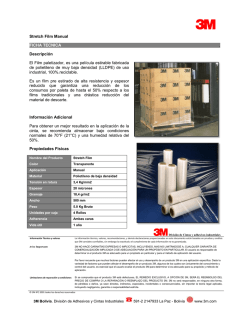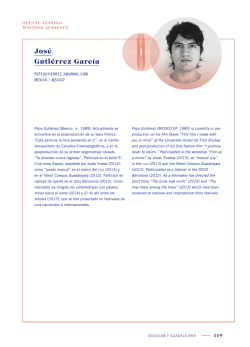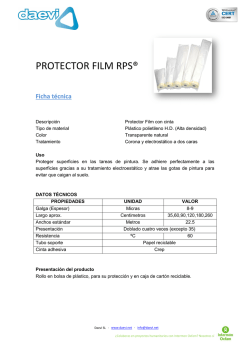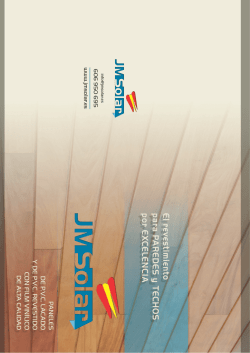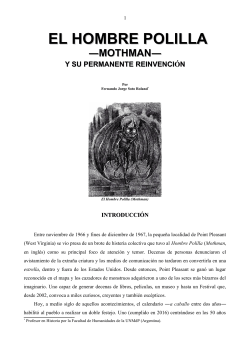
Acta jurado Punto de Encuentro
ACTA DEL JURADO DE «PUNTO DE ENCUENTRO» «MEETING POINT» JURY AWARDS El Jurado de la sección “Punto de Encuentro” de la 61 Semana Internacional de Cine de Valladolid, integrado por: / The Jury of the “Meeting Point” section of 61st Valladolid International Film Festival formed by: DANIEL CEBRIÁN, (España/Spain), CLAUDIA LANDSBERGER (Países Bajos/The Netherlands) y/& CARLOS R. RÍOS (España/Spain): ha decidido otorgar los siguientes premios: has decided to grant the following awards: Premio ‘La Noche del Corto Español’: / ‘A Night of Spanish Shorts’ Award: «The App», de Julián Merino. El jurado de Punto de Encuentro quisiera señalar la excelente calidad de los cinco cortometrajes españoles a concurso en la sección, por su eficacia narrativa, méritos cinematográficos y valores de producción. Hemos elegido The App como mejor corto en una pugna muy reñida. Queremos reseñar la originalidad de una película inteligente y llena de sentido del humor. The App es una comedia solo en apariencia ligera que esconde una lúcida metáfora de la era digital que vivimos y cuya consecuencia absurda, pero lógica, es la completa deslocalización de las decisiones que determinarán nuestro destino. El giro final, valiente, incluso cruel, pero hábil, dota al cortometraje de un final consecuente y honesto con el propio corto. The members of the Meeting Point jury would like to stress the excellent quality of the five Spanish short films in competition, due to their narrative efficiency, cinematic merits and production values. We have chosen The App as best short in a hard fought battle. We would like to point out the originality and the blatant sense of humor of this intelligent film. The App, a light comedy only in appearance, hides a lucid metaphor of the digital age we live in, whose absurd yet logical consequence is the ultimate outsourcing of our final decisions, those which will eventually determine our fate. The cruel, bold, but clever plot twist makes the ending of the film consistent and honest to the film itself. …/… …/… Premio al Mejor Cortometraje Extranjero: / Award to the Best Foreign Short: «Po čovika» (Medio hombre), de Kristina Kumric, Croacia/Francia. « Po čovika» (Half A Man) by Kristina Kumric, Croatia/France. Medio Hombre es la vez una historia potente contada a través de los ojos de una niña privada de infancia, y una mirada profunda a las heridas de la guerra. La apariencia plácida de esta película situada en una tarde apacible de verano centroeuropeo esconde un mar de fondo embravecido que se desvela sutilmente para golpear al espectador desde dentro: no hay cara buena de la guerra y no existen los héroes épicos. Half A Man is at the same time a powerful, strong tale told through the eyes of a child deprived of childhood, and a deep glance at the wounds of war. The placid appearance of this film located on a quiet summer Central European afternoon hides a sea bottom swell that subtly reveals itself to hit the viewer from within: the good side of a war is non-existent and there are really no epic heroes. Premio al Mejor Largometraje: / Prize to the Best Feature: «NE GLEDAJ MI U PIJAT» (Deja de mirar mi plato), de Hana Jušić, Croacia/Dinamarca. «NE GLEDAJ MI U PIJAT» (Quit Staring At My Plate) by Hana Jušić, Croatia/Denmark. Deja de mirar mi plato es una película valiente, que en ningún momento toma el sendero fácil de la narración para mostrar con pulso firme y un tempo muy sólido, la verdad incómoda de sus personajes. Carente de trucos emocionales, la historia avanza siempre por delante del espectador y lo arrastra sin perderlo a acompañar a la protagonista sin necesidad de juzgarla, perdonarla o ni siquiera entenderla. Como espectador de esta historia, uno tiene la sensación de que la cámara mira siempre al sitio exacto y desde el ángulo exacto desde el que debiera hacerlo. La realización ágil, libre, que recuerda al mejor Cassavettes y que sólo se sujeta a las exigencias del relato y no a los caprichos estilísticos del autor, acompaña perfectamente una historia cuya fortaleza deriva de la originalidad de la mirada y no de la verosimilitud de las situaciones que cuenta. …/… …/… Quit staring at my plate is a brave, bold film that at no point takes any easy narrative path, but shows with a firm pulse and a solid tempo the uncomfortable truth of its characters. Devoid of emotional tricks, the story always moves forward, ahead of the viewer, and drags him –not ever letting him loose, to travel alongside the protagonist without ever having to judge her, forgive her or even understand her. As a viewer of this story, one has the feeling that the camera always points at the exact spot and from the exact angle at which it should. The agile, free helming, reminiscent of the best Cassavetes and only subject to the requirements of the account and not to any stylistic whims of the author, beautifully supports a tale whose strength is derived from the originality of the look and not the likelihood of situations depicted. Valladolid, 29 de octubre de 2016 DANIEL CEBRIÁN CLAUDIA LANDSBERGER CARLOS R. RÍOS
© Copyright 2026
